So Zacharia has made his first enemy, it is a lowborn this time but he should be careful in the future.
Jerusalem Calling - A Khazarian AAR
- Thread starter terr0rizm
- Start date
-
We have updated our Community Code of Conduct. Please read through the new rules for the forum that are an integral part of Paradox Interactive’s User Agreement.
You are using an out of date browser. It may not display this or other websites correctly.
You should upgrade or use an alternative browser.
You should upgrade or use an alternative browser.
So Zacharia has made his first enemy, it is a lowborn this time but he should be careful in the future.
Adequate enemy management is something he would actually be up to, were it not for those occasional fits of rage... There's always a "but" with this guy.
We'll see more of Angry Zachariah once things get more complicated around Khazaria.
I've made it to the second page. Thanks again for every comment and every silent read so far.
Chapter 6 - Beyond the Borders
Chapter 6 - Beyond the Borders
October 1, 867 AD
More than half a year of the war against the Pechenegs had passed with no major engagement taking place. The Khazarians marched to Sol's main settlement in the plains of Sary-Su largely undisturbed. It wasn't until they were on the brink of losing Sary-Su that the Pecheneg army marched to defend their heartland. Manasseh's troops were in numerical and tactical advantage though, beat back the Pecheneg attack and took over the settlement.
Upon this defeat, the Pecheneg Khagan Sol had desperately called his neighbours to the war, some of which were themselves tributaries to Manasseh and obviously sought their chance to weaken their overlord. Although it seemed unlikely to tip the scales back in his favor, Sol gaining allies bought him some time and room to fall back to.
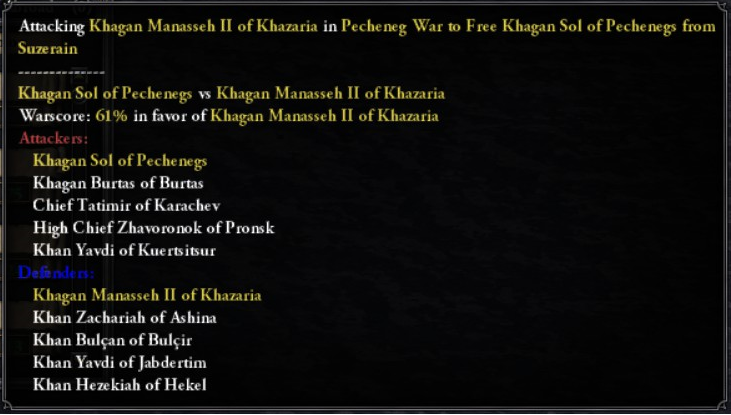
Now his troops were on the retreat to Pronsk, another tributary of Khazaria to the north of the Khazarian lands who had answered his call but was currently busy invading the neighbouring High Chiefdom of Karachev (also tributary to Manasseh and part of the coalition lead by Sol of Pechenegs). The Ashina commanders had sent out scouts in advance to the battle of Sary-Su who confirmed timely that their interference would not be needed there. Tabghaç, the marshal of Ashina and therefore in charge of the strategical decisions for the campaign, had thus ordered the horde to ride west and cut off the Pechenegs on their way back to the homefront.
The council had met up to discuss the recent developments, this time including Ezra, the chancellor. He had spent most of the past nine months in Bulçir, but had left a few weeks ago when combat had erupted in the vicinity. There was not much to be gained with kind words under that kind of circumstances, and there was no reason to put him at risk. Ezra explained the broader situation to his fellows.
"As you all know now, the war on the Pechenegs is looking well for our side and it's unlikely to change anytime soon. Half of Sol's allies are busy fighting each other and his army keeps losing ground to the Khazarian forces.
In the west, the Magyars seem to have some success invading their alleged homeland in Bulgarian hands. It's reported though that the war effort is lasting heavily on their Khagan Árpád Álmos' resources and he won't be able to keep up at this pace forever. As it looks now, he won't pose an immediate threat for some time as his priorities clearly are directed westwards."
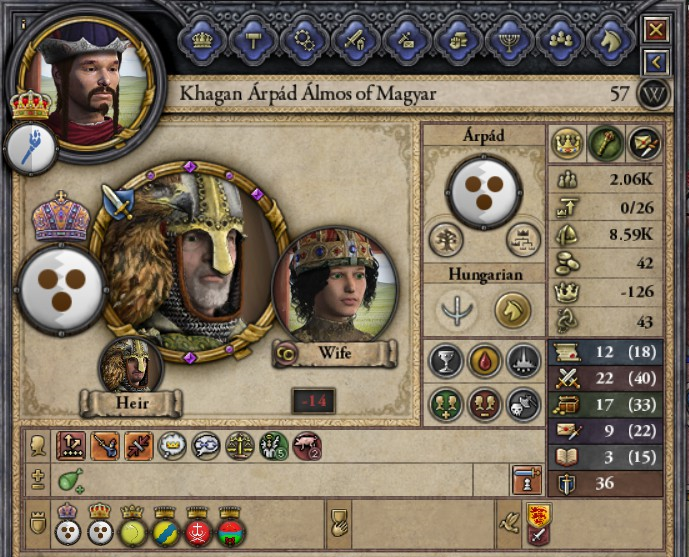
"On the Caucasus, the fighting drags on. I'll admit that it's hard to keep track of what is transpiring in Azerbaijan and everything to say would be naught but a moment's note, but it's clear that Alania is overrun as we speak. The Hashimids are plowing through their lands while their own army is stuck in the Caspian region. They're supported by the Georgians, but still won't move out to reclaim their turf or drive the Hashimids away. I don't know what their leaders are thinking, but at this pace the war will be lost soon.
To us, this means in the first place that Manasseh seems to be unable or unwilling to fight at two fronts - at least for the moment. We always need to be watchful and rely on our own strength."
Zachariah nodded. "Thank you, Ezra. In fact, I got a message earlier that said something about Alania, but I wanted to finish eating first and then forgot about it." He walked over to his desk, on which several stacks of paper were gathering dust, and brought forth a letter.
"Let me see.....oh. Oh well. This is embarassing, I should have notified you...Alania seems to have surrendered by the early morning. Durdzukia is now part of the Hashimid realm. Bad for them, I guess."
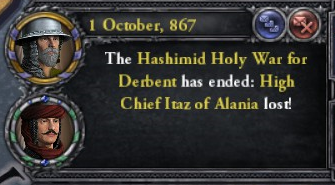
Ezra gave Zachariah an annoyed look, but said nothing. Yeldem rolled her eyes, not bothering with secrecy this time.
October 1, 867 AD
More than half a year of the war against the Pechenegs had passed with no major engagement taking place. The Khazarians marched to Sol's main settlement in the plains of Sary-Su largely undisturbed. It wasn't until they were on the brink of losing Sary-Su that the Pecheneg army marched to defend their heartland. Manasseh's troops were in numerical and tactical advantage though, beat back the Pecheneg attack and took over the settlement.
Upon this defeat, the Pecheneg Khagan Sol had desperately called his neighbours to the war, some of which were themselves tributaries to Manasseh and obviously sought their chance to weaken their overlord. Although it seemed unlikely to tip the scales back in his favor, Sol gaining allies bought him some time and room to fall back to.

Now his troops were on the retreat to Pronsk, another tributary of Khazaria to the north of the Khazarian lands who had answered his call but was currently busy invading the neighbouring High Chiefdom of Karachev (also tributary to Manasseh and part of the coalition lead by Sol of Pechenegs). The Ashina commanders had sent out scouts in advance to the battle of Sary-Su who confirmed timely that their interference would not be needed there. Tabghaç, the marshal of Ashina and therefore in charge of the strategical decisions for the campaign, had thus ordered the horde to ride west and cut off the Pechenegs on their way back to the homefront.
The council had met up to discuss the recent developments, this time including Ezra, the chancellor. He had spent most of the past nine months in Bulçir, but had left a few weeks ago when combat had erupted in the vicinity. There was not much to be gained with kind words under that kind of circumstances, and there was no reason to put him at risk. Ezra explained the broader situation to his fellows.
"As you all know now, the war on the Pechenegs is looking well for our side and it's unlikely to change anytime soon. Half of Sol's allies are busy fighting each other and his army keeps losing ground to the Khazarian forces.
In the west, the Magyars seem to have some success invading their alleged homeland in Bulgarian hands. It's reported though that the war effort is lasting heavily on their Khagan Árpád Álmos' resources and he won't be able to keep up at this pace forever. As it looks now, he won't pose an immediate threat for some time as his priorities clearly are directed westwards."

"On the Caucasus, the fighting drags on. I'll admit that it's hard to keep track of what is transpiring in Azerbaijan and everything to say would be naught but a moment's note, but it's clear that Alania is overrun as we speak. The Hashimids are plowing through their lands while their own army is stuck in the Caspian region. They're supported by the Georgians, but still won't move out to reclaim their turf or drive the Hashimids away. I don't know what their leaders are thinking, but at this pace the war will be lost soon.
To us, this means in the first place that Manasseh seems to be unable or unwilling to fight at two fronts - at least for the moment. We always need to be watchful and rely on our own strength."
Zachariah nodded. "Thank you, Ezra. In fact, I got a message earlier that said something about Alania, but I wanted to finish eating first and then forgot about it." He walked over to his desk, on which several stacks of paper were gathering dust, and brought forth a letter.
"Let me see.....oh. Oh well. This is embarassing, I should have notified you...Alania seems to have surrendered by the early morning. Durdzukia is now part of the Hashimid realm. Bad for them, I guess."

Ezra gave Zachariah an annoyed look, but said nothing. Yeldem rolled her eyes, not bothering with secrecy this time.
Last edited:
Chapter 7 - Lose the Battle, Win the War
Chapter 7 - Lose the Battle, Win the War
July 13, 869 AD
The war dragged on, with no sign of Sol of Pecheneg ceasing to fight. Pronsk had subjugated Karachev in the early days of 868 and their army came to aid the Pechenegs in their quest for sovereignty. The Khazarians were still at a sizable advantage in numbers as the main armies of the Khanates – except Ashina – had converged on the banks of the Don river, but their reinforcements were being cut off in the west by the Pronskian army.
Zachariah was glad no one expected him at the front, what with his numerous duties in his own realm and as the Khagan's steward. He would spend more time in Tmutarakan now - he trusted his councillors and the lower administrators to keep things running at home and keep him informed. He still wasn't thrilled with the tasks of a steward, but life was slower when he wasn't expected to rule, but mostly to run numbers. So Zachariah often found time to enjoy the landscape and the amenities in Manasseh's premises free of sorrows. On one of these strolls, he witnessed that the Khagan's spymaster Khuterkin, a lowborn who had made it to his position through a mixture of luck and shrewdness, did not seem to be as relaxed about his obligations. Zachariah found enjoyment in plotting and scheming, and he figured that the spymaster of the realm would not be the worst ally to have. So why not give him a hand?
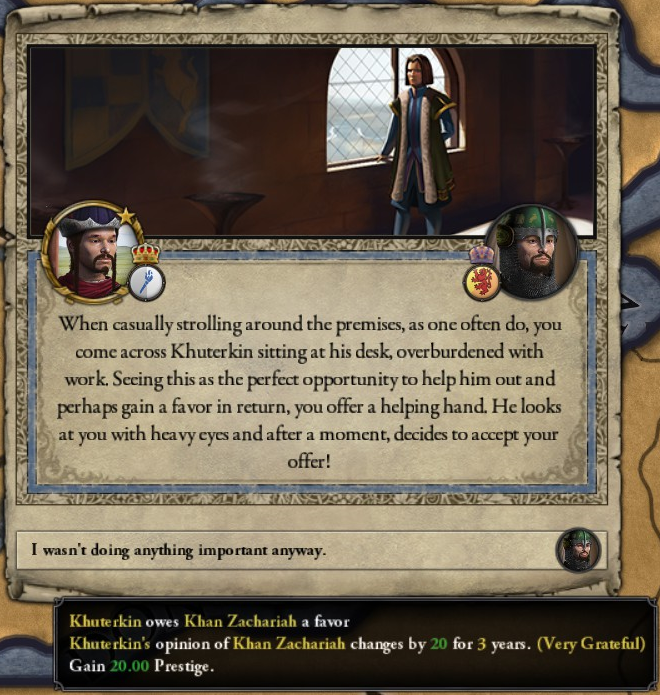
Farther to the North, it had taken the Pecheneg army months to recover after their defeat at Sary-Su. When they headed back towards their home with about 1400 men left to try and get their main settlement back, they soon discovered they were heading toward the main force of Khagan Manasseh. A battle would mean certain annihilation – the Pechenegs being outnumbered three to one and the Pronskian forces too far away to possibly help out in time.
Their only resort was to flee to Desht-i-Kipchak. The region where the Ashina troops and a small supporting force from Bulçir had set up camp, waiting for exactly this to happen. Finally, glory awaited. They were about even in numbers, but the Ashina were in control of the terrain and prepared to lay a trap for the fugitive Pecheneg army they planned to keep busy until the Khagan's army arrived.
So much for their plans.
When the Pechenegs arrived, it was way off from where the Ashina commanders had expected them and any tactical advantage they had was squandered. After hours of skirmishing and the hit-and-run warfare typical for armies on horseback, the inexperienced Ashina commander Tarkhan (unrelated to Zachariah's father) made a wrong call, and the Pecheneg troops somehow managed to encircle the better part of the Ashina host. The rest was too scattered and too few to help them out. Eventually, the main host would escape the circle in a concentrated effort, but there was nothing left to win. Although the Pechenegs' losses were greater than their own the Ashina army saw to a hasty retreat eastwards.
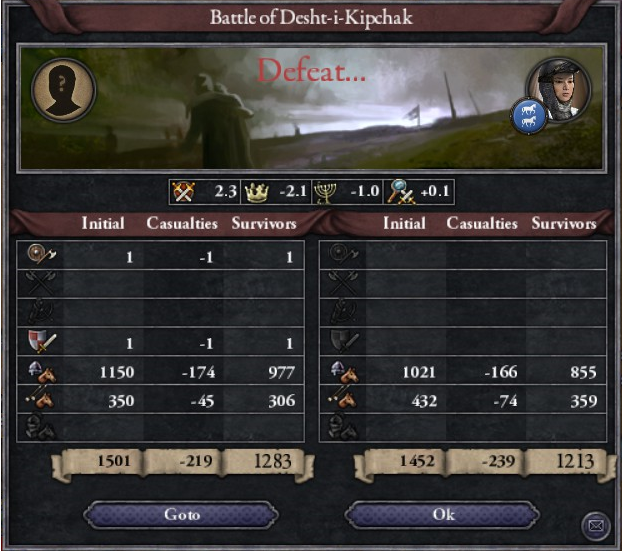
One crucial mistake had lost them the battle before the arrival of the Khazarian army. Only days later, the main force of Khagan Manasseh finally arrived at Desht-i-Kipchak and shattered the exhausted Pechenegs. At least the defeat of the Ashina army secured a larger victory for their allies.
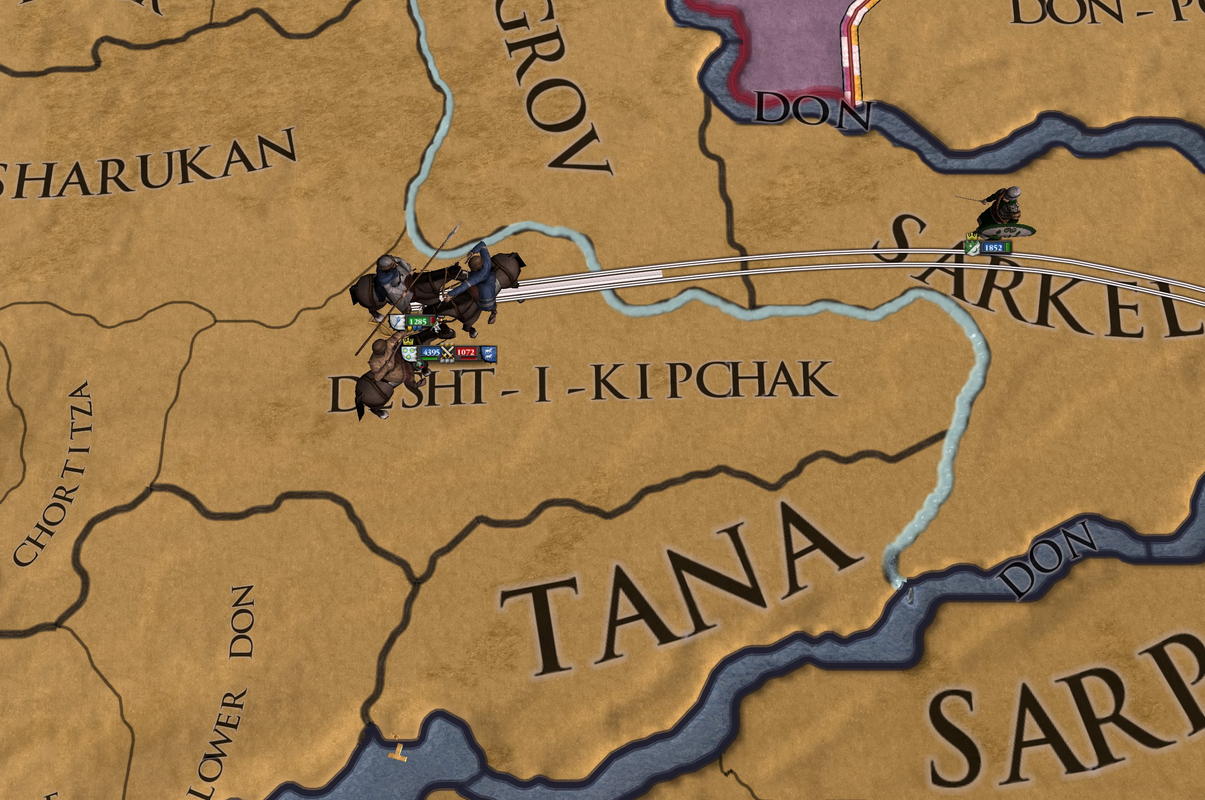
Zachariah was displeased with the outcome and sent a messenger out to Tarkhan who was still with the retreating army that he was no longer commander and replaced immediately. His soldiers had brought word of an exceptional warrior from a minor noble clan that had acted in an all-out heroic manner during the battle of Desht-i-Kipchak, plunging into every fight and saving dozens of his fellows' lives in the chaotic retreat. He went by the name of Khatir Azizid and would be named the new commander for his braveness and his merits.
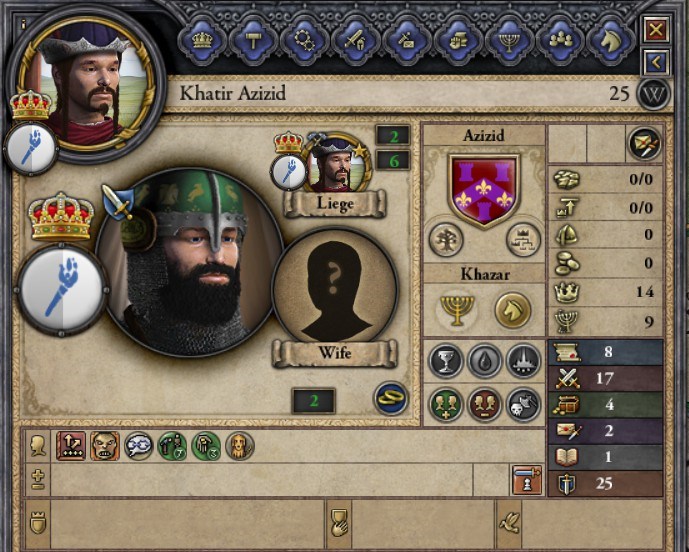
In spite of their losses on the steppes, the Pechenegs still refused to surrender. No one in Khazaria could imagine what Sol of Pechenegs hoped to achieve by refusing peace at this point, but there was nothing to be done – the Khazarians had to turn to the lands of Sol's allies.
Zachariah and his marshal thus ordered Khatir to lead his armies to the north, to besiege the Khagan of Burtas' lands. The man was tributary to Khagan Manasseh too, and probably hoped a prolonged war would weaken his suzerain. The Ashina took over their lands in Cheremisa without much further ado. When that was taken care of, the Ashina met a shattered Pronskian army on their way home on the fields of Yelets. They too had been defeated by the Khazarian main force before, leaving no practical chance for this war to be turned around. Khatir would not let this opportunity to get satisfaction for the defeat at Desht-i-Kipchak slip and attacked the Pronskians.
The battle of Yelets was a shining victory to Ashina, the final nail in the coffin of Sol's efforts. The enemy commander, a son of the Pronskian High Chief, was captured and held hostage until peace talks would be concluded.
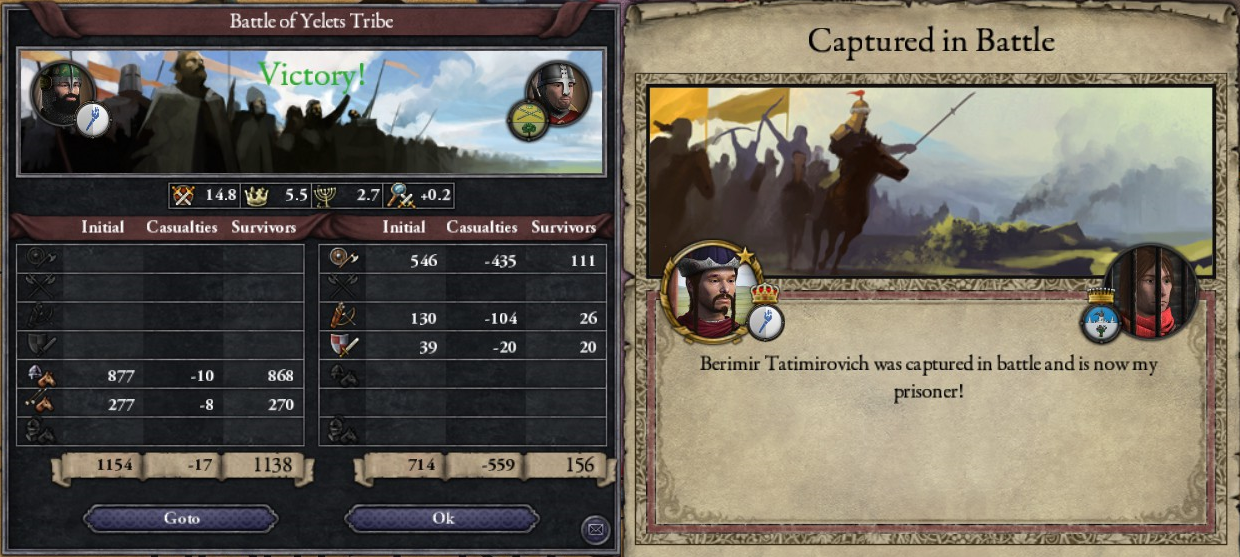
Under these circumstances, Sol of Pechenegs could no longer refrain from surrendering.
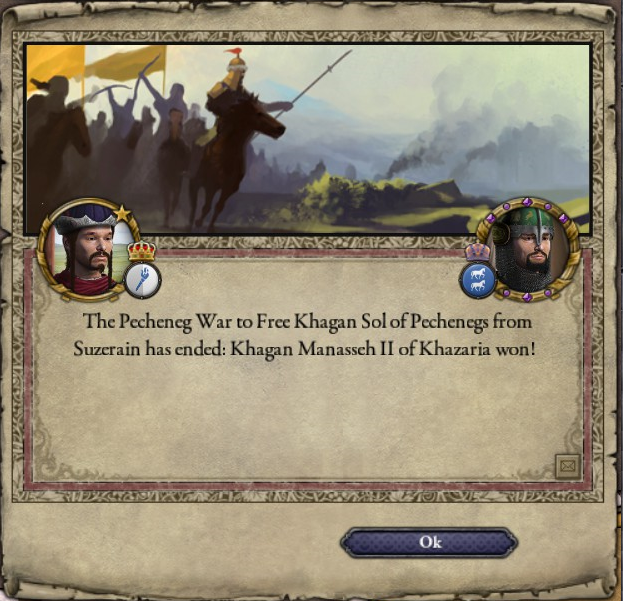
The war was over and the Pechenegs back in line. Khagan Manasseh was victorious, and the Ashina force had played a part significant for Khan Zachariah and his military staff to be presented with (mostly titular) promotions during the celebrations.
In the evening, the Ashina envoy got back to Theodosia. Zachariah was content with himself again. In a war where there was little at stake for himself, he had proved his worth to the Khagan as well as to his own men. With this new reputation behind his word, the Khan ordered his marshal to raise a new host of 1000 men and resume plundering in Cherson.
Tabghaç turned a little pale. "My Khan....1000 more men would mean near doubling our current forces. Although we have enough men eligible to form this kind of host, it might take quite an effort to properly fill their ranks. There's also been the need to reinforce the losses after Desht-i-Kipchak. There might not be sufficient candidates around to sustain all our troops for now."
Zachariah had listened without much dedication. "Then find more men. There's a boy coming of age every day around the realm. I'm sure you will manage. We can't afford to come off weak now that the Khagan has demonstrated his power so profoundly and the spoils from Cherson will fund further accomodations for new recruits. Now off with you, there's much work to be done."
With this, Zachariah hid behind some paperwork he was definitely going to read in detail tomorrow.
July 13, 869 AD
The war dragged on, with no sign of Sol of Pecheneg ceasing to fight. Pronsk had subjugated Karachev in the early days of 868 and their army came to aid the Pechenegs in their quest for sovereignty. The Khazarians were still at a sizable advantage in numbers as the main armies of the Khanates – except Ashina – had converged on the banks of the Don river, but their reinforcements were being cut off in the west by the Pronskian army.
Zachariah was glad no one expected him at the front, what with his numerous duties in his own realm and as the Khagan's steward. He would spend more time in Tmutarakan now - he trusted his councillors and the lower administrators to keep things running at home and keep him informed. He still wasn't thrilled with the tasks of a steward, but life was slower when he wasn't expected to rule, but mostly to run numbers. So Zachariah often found time to enjoy the landscape and the amenities in Manasseh's premises free of sorrows. On one of these strolls, he witnessed that the Khagan's spymaster Khuterkin, a lowborn who had made it to his position through a mixture of luck and shrewdness, did not seem to be as relaxed about his obligations. Zachariah found enjoyment in plotting and scheming, and he figured that the spymaster of the realm would not be the worst ally to have. So why not give him a hand?

Farther to the North, it had taken the Pecheneg army months to recover after their defeat at Sary-Su. When they headed back towards their home with about 1400 men left to try and get their main settlement back, they soon discovered they were heading toward the main force of Khagan Manasseh. A battle would mean certain annihilation – the Pechenegs being outnumbered three to one and the Pronskian forces too far away to possibly help out in time.
Their only resort was to flee to Desht-i-Kipchak. The region where the Ashina troops and a small supporting force from Bulçir had set up camp, waiting for exactly this to happen. Finally, glory awaited. They were about even in numbers, but the Ashina were in control of the terrain and prepared to lay a trap for the fugitive Pecheneg army they planned to keep busy until the Khagan's army arrived.
So much for their plans.
When the Pechenegs arrived, it was way off from where the Ashina commanders had expected them and any tactical advantage they had was squandered. After hours of skirmishing and the hit-and-run warfare typical for armies on horseback, the inexperienced Ashina commander Tarkhan (unrelated to Zachariah's father) made a wrong call, and the Pecheneg troops somehow managed to encircle the better part of the Ashina host. The rest was too scattered and too few to help them out. Eventually, the main host would escape the circle in a concentrated effort, but there was nothing left to win. Although the Pechenegs' losses were greater than their own the Ashina army saw to a hasty retreat eastwards.

One crucial mistake had lost them the battle before the arrival of the Khazarian army. Only days later, the main force of Khagan Manasseh finally arrived at Desht-i-Kipchak and shattered the exhausted Pechenegs. At least the defeat of the Ashina army secured a larger victory for their allies.

Zachariah was displeased with the outcome and sent a messenger out to Tarkhan who was still with the retreating army that he was no longer commander and replaced immediately. His soldiers had brought word of an exceptional warrior from a minor noble clan that had acted in an all-out heroic manner during the battle of Desht-i-Kipchak, plunging into every fight and saving dozens of his fellows' lives in the chaotic retreat. He went by the name of Khatir Azizid and would be named the new commander for his braveness and his merits.

In spite of their losses on the steppes, the Pechenegs still refused to surrender. No one in Khazaria could imagine what Sol of Pechenegs hoped to achieve by refusing peace at this point, but there was nothing to be done – the Khazarians had to turn to the lands of Sol's allies.
Zachariah and his marshal thus ordered Khatir to lead his armies to the north, to besiege the Khagan of Burtas' lands. The man was tributary to Khagan Manasseh too, and probably hoped a prolonged war would weaken his suzerain. The Ashina took over their lands in Cheremisa without much further ado. When that was taken care of, the Ashina met a shattered Pronskian army on their way home on the fields of Yelets. They too had been defeated by the Khazarian main force before, leaving no practical chance for this war to be turned around. Khatir would not let this opportunity to get satisfaction for the defeat at Desht-i-Kipchak slip and attacked the Pronskians.
The battle of Yelets was a shining victory to Ashina, the final nail in the coffin of Sol's efforts. The enemy commander, a son of the Pronskian High Chief, was captured and held hostage until peace talks would be concluded.

Under these circumstances, Sol of Pechenegs could no longer refrain from surrendering.

The war was over and the Pechenegs back in line. Khagan Manasseh was victorious, and the Ashina force had played a part significant for Khan Zachariah and his military staff to be presented with (mostly titular) promotions during the celebrations.
In the evening, the Ashina envoy got back to Theodosia. Zachariah was content with himself again. In a war where there was little at stake for himself, he had proved his worth to the Khagan as well as to his own men. With this new reputation behind his word, the Khan ordered his marshal to raise a new host of 1000 men and resume plundering in Cherson.
Tabghaç turned a little pale. "My Khan....1000 more men would mean near doubling our current forces. Although we have enough men eligible to form this kind of host, it might take quite an effort to properly fill their ranks. There's also been the need to reinforce the losses after Desht-i-Kipchak. There might not be sufficient candidates around to sustain all our troops for now."
Zachariah had listened without much dedication. "Then find more men. There's a boy coming of age every day around the realm. I'm sure you will manage. We can't afford to come off weak now that the Khagan has demonstrated his power so profoundly and the spoils from Cherson will fund further accomodations for new recruits. Now off with you, there's much work to be done."
With this, Zachariah hid behind some paperwork he was definitely going to read in detail tomorrow.
Last edited:
Zachariah finally got stung into some sort of belated action, not that it mattered at all.
Zachariah finally got stung into some sort of belated action, not that it mattered at all.
Little glory to be found in a rather mundane steppe skirmish. But everyone's gotta do his part, as small and misfortunate as it may be - and he's learning valuable lessons, e.g. that finding capable commanders may actually be something worth looking into.
Chapter 8 - New Conflicts
Chapter 8 - New Conflicts
August 25, 869 AD
You could feel the unrest in the Ashina settlement in Theodosia. The air was shimmering in the summer heat, as if it was filled with tension waiting to be unleashed. Dozens of fresh recruits had been brought in over the past weeks. Marshal Tabghaç had redoubled his efforts when word spread that Khagan Manasseh had declared war again, only days after Sol of Pechenegs had surrendered. Still, as Tabghaç had predicted, there would not be enough manpower anytime soon to form a host as big as Khan Zachariah had demanded of him.
Manasseh's new target was the Khagan of Bolghar who ruled over the sizeable realm to the northeastern border of Khazaria and had taken a province of Khazarian tributary Burtas in the turmoil of the Pecheneg war. This had seemingly angered Khagan Manasseh, who was bursting with confidence after his recent victory.
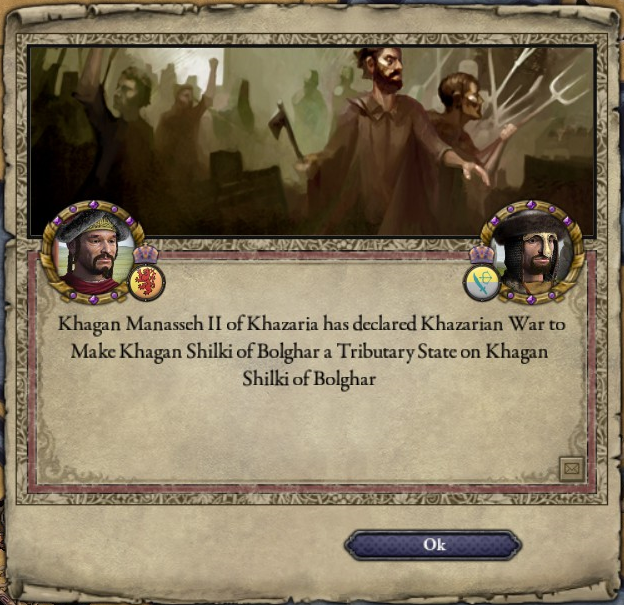
It was short before noon, and the camp was bustling. When armies got prepared for march in the Steppes, it was as if a whole village moved (which happened too – the main difference was whether the village was intent to come back). It wasn't uncommon that the trecks along larger armies, with all the people supplying and maintaining the troops, contained four or five times as many people as there were actual soldiers. At wartime Theodosia was mainly inhabited by women and children. No call to arms had arrived yet, but with the news of Manasseh's newest exploits everybody knew this would most likely be a matter of time.
Tabghaç was hurrying through the ado to the Khan's yurt with important news. The guards announced his arrival. Zachariah who had been fiddling with a dreidel picked some papers from his desk and set up his usual impression of being swamped in the countless duties and responsibilities of a Khan. He barely looked up when Tabghaç entered. "What's going on, Marshal?"
"My Khan, there's actually quite a lot going on since Sol called his defeat.
As you already know, Khagan Manasseh attacked the Bolghars two weeks ago. The Bolghar Khagan has called in his vassals successfully in the meantime and it's safe to expect that Manasseh will too send out calls to arms soon.
The Magyars have finished their invasion in the West. Árpád Álmos stands stronger than ever before and is expected to soon move his court to his new lands beyond the Carpathian.
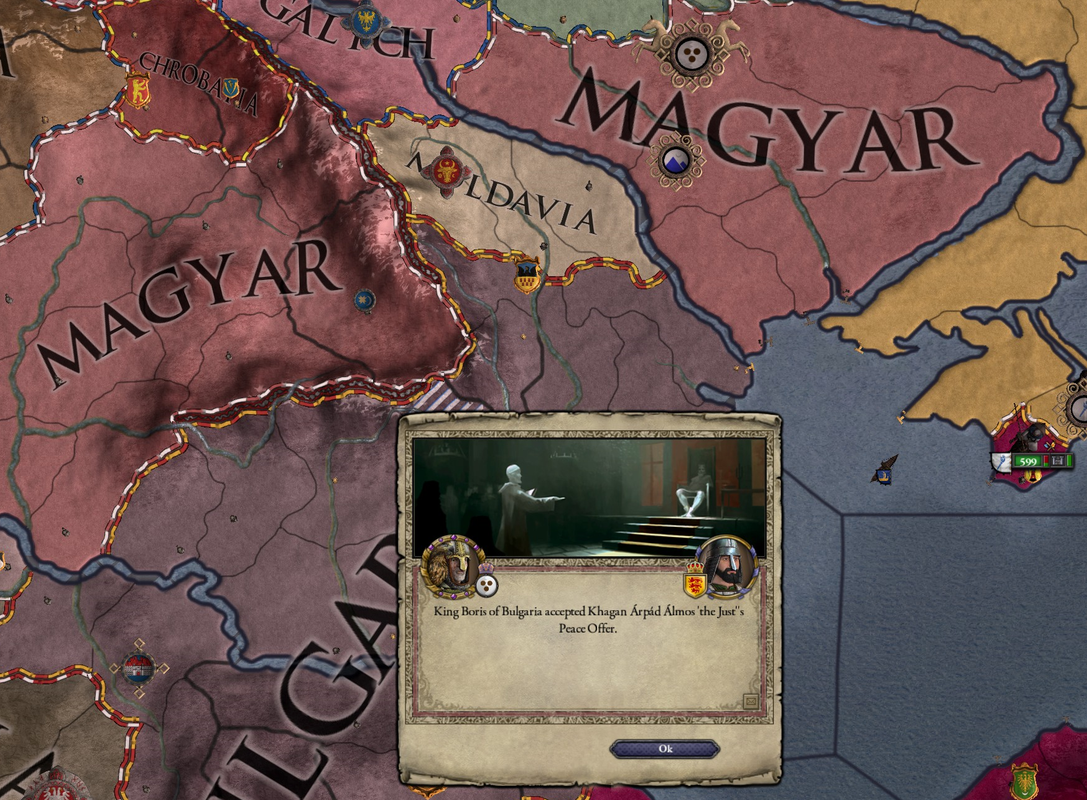
Now, my Khan" – Tabghaç made a pregnant pause to make sure he had his liege's attention – "there's news from the northern border.
Yelisey, the High Chief of Polotsk, has declared war for subjugation of the Pronskians. As their suzerain, Manasseh is responsible for their protection and has little choice but to take on that war as well. High Chief Zhavoronok of Pronsk is already under heavy pressure from a host of revolting peasants from Vorotynsk, a chiefdom under his control bordering Polotsk. There is little prospect of him being able to defend himself on his own."
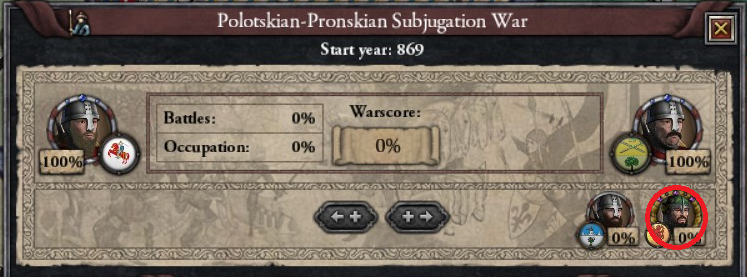
Zachariah had been paying attention after all and agreed that this was indeed important. The council was called in as of immediate.
The news were met with awe. It was obvious to everyone that Manasseh, even with the help of his vassals, would struggle to win two wars at the same time. Zachariah saluted to Tabghaç when he had briefed the council of the situation and took up word.
"Thank you, Marshal. I fully agree with your assertion that a call to the Bolghar war will come in soon. Nevertheless – in my eyes it's only remotely our problem. Any hostilities will take place to the other side of the realm, and Manasseh has essentially brought this two-front situation upon himself. I will of course answer any call to arms – anything else would be terribly dishonorable", and he smirked a little, "but as long as the Bolghars and the Polotskians stay out of Ashina lands, there is no particular reason to shed the blood of our men for Manasseh again. The pending expansion of our own horde should be our first priority. Now Ezra, as the leading expert for foreign affairs in our humble lands, I would like to hear your thoughts on the matter."
Ezra was pleased by the comment on his skills, but remained stern as usual. "Well, first I would advise you to stay wary in all cases. Neither the Polotskians nor the Bolghars have an immediate reason to cross our borders, that is true. Yet that might change quickly if things go badly for Manasseh. And sometimes, for things to go badly all it takes is one wrong turn and one lost battle. Especially if you're fighting on two fronts.
Manasseh can obviously call his vassals and tributaries into the war on Shilki of Bolghar. With their support, he outnumbers the Bolghars considerably. However, no calls are possible for the war in Pronsk as Manasseh is not leading that war, so he's largely on his own there and might well be outnumbered by the Polotskians. There's also the issue of time. Pronsk may already be lost by the time the war on Bolghar is concluded, which would leave Khazaria very vulnerable to the Russian flank - where there's another potential threat looming.
Do you remember that Varangian self-appointed King who's settled in Könugardr, across the river from the the Jabdertim Clan? That man has brought a sizable force from his homeland and they're expanding. He's subjugated Turov and Minsk in quick succession and is currently besieging the High Chiefdom of Smolensk, right next to Pronsk. He supposedly has even more men than the Polotskians, who count in at about 5000. If we're lucky, Könugardr and Polotsk turn on each other and leave Khazaria alone. If not – or if Manasseh is weakened – these two wars are just the beginning. There is no mercy in the Steppes nor in the Russian plains for weakened ones."
"Or people counting on their luck", Yeldem added grimly.
Zachariah had not been able to fully keep track of the chancellor's effectuations, but what he had understood was that his actions suddenly carried weight. What he and his staff decided would not be a nuisance or a friendly gesture to the Khagan. It could change the course of the war, possibly the realm. And he'd better not gamble around.
"That was very insightful, Ezra. I'll have to contemplate on it. Scribe, I hope you paid attention. Yeldem, you're itching to talk, I see that. Go ahead."
Yeldem gave him a half-amused, half-annoyed look. "I just want to remind everyone that Polotsk and Könugardr are not the only realms to possibly benefit from a weak Khagan. Neither of the other Khans is going to pass if a chance arises – through certain events - to become Khagan themselves or break off his rule. At least not because they're particularly fond of him.
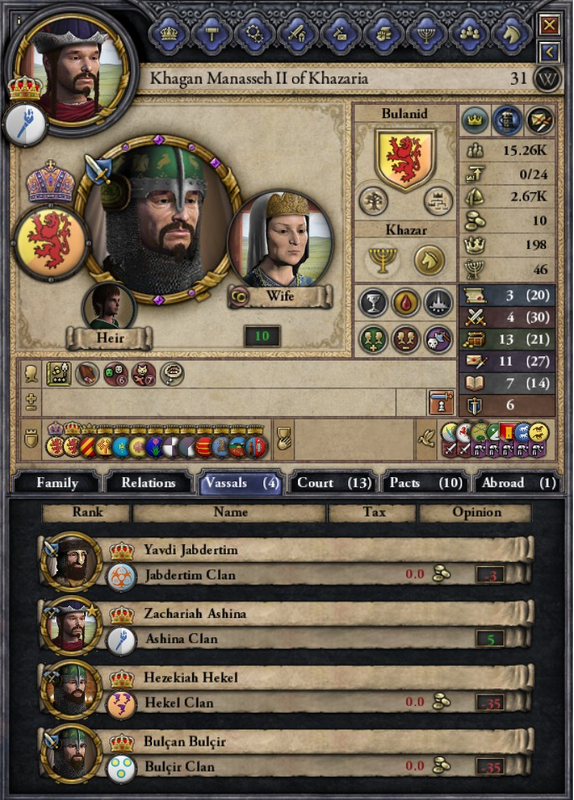
And you know exactly how those Bulanids pay off loyalty. They have their interests, we have ours - they don't necessarily coincide."
"Thanks for the input, Yeldem. You're most certainly right, which makes it all the harder to decide what to do. I have to think through this in quiet, and fast. I dismiss the council for today and rule as follows:
As long as there is no call to arms, we act as if nothing ever happened – we can't do much anyways without a formal invitation to Manasseh's wars. Should the call arrive, we answer and send a small reinforcement troop at max until the situation calls for other measures. Council dismissed."
With that, Zachariah left. His concubine Shirkka, with whom he had been planning a ride on the beach, was waiting for him. Plenty of time to think through what this new eruption of conflicts at the Khazarian borders would mean to him. His other councillors stayed behind, save for Kayghalagh the court Rabbi, who claimed he needed to preside over a wedding. The others knew he cared little about politics (or religion), so they didn't ask questions.
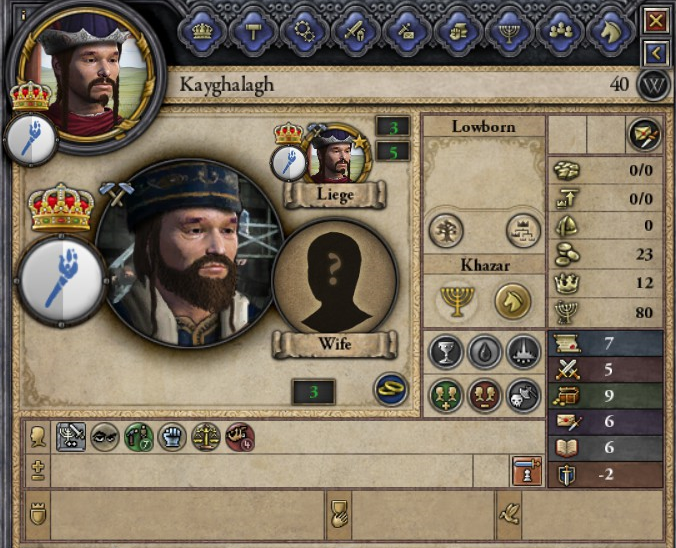
"So this might be a major turning point for Khazaria and the whole region - and we do nothing. We just sit and wait", Kundaç turned to Ezra with visible discontent.
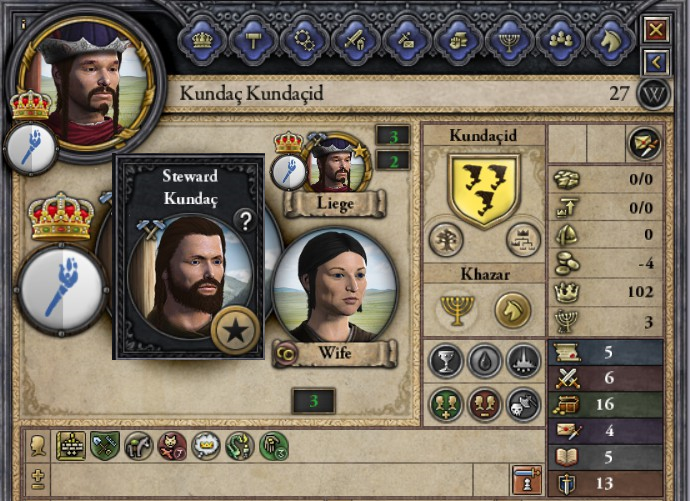
"Yes. It might be a major turning point. Or not. It might actually be the smartest thing for now to watch the events unfold before we decide on a course of action. We'll at least wait until the call to arms arrives and see how things are looking by then."
Kundaç grunted "There's no honor in trying to wait things out for your own favor, and y'all know it very well. We're under an oath to the Khagan to join his side in war, not to hold a ceremony where we lie about joining his side. Those are the ways of the wretched decadent castle lords and so-called 'Burghers' to the West, where children's throats are cut by their own maids if some Berron or however they call themselves decides he's bored of his hold and all the incest within it. You should be ashamed of yourselves, not to speak of that so-called Khan!"
When Kundaç had finished his rant, he as well stormed out. Yeldem, Tabghaç and Ezra snickered and returned to their business of ruling the realm. They were used to his rambling about blood and glory as well as to Zachariah's sometimes overcautious decision-making by now and were positive the opportunities would show themselves.
Although no one would know yet how soon.
August 25, 869 AD
You could feel the unrest in the Ashina settlement in Theodosia. The air was shimmering in the summer heat, as if it was filled with tension waiting to be unleashed. Dozens of fresh recruits had been brought in over the past weeks. Marshal Tabghaç had redoubled his efforts when word spread that Khagan Manasseh had declared war again, only days after Sol of Pechenegs had surrendered. Still, as Tabghaç had predicted, there would not be enough manpower anytime soon to form a host as big as Khan Zachariah had demanded of him.
Manasseh's new target was the Khagan of Bolghar who ruled over the sizeable realm to the northeastern border of Khazaria and had taken a province of Khazarian tributary Burtas in the turmoil of the Pecheneg war. This had seemingly angered Khagan Manasseh, who was bursting with confidence after his recent victory.

It was short before noon, and the camp was bustling. When armies got prepared for march in the Steppes, it was as if a whole village moved (which happened too – the main difference was whether the village was intent to come back). It wasn't uncommon that the trecks along larger armies, with all the people supplying and maintaining the troops, contained four or five times as many people as there were actual soldiers. At wartime Theodosia was mainly inhabited by women and children. No call to arms had arrived yet, but with the news of Manasseh's newest exploits everybody knew this would most likely be a matter of time.
Tabghaç was hurrying through the ado to the Khan's yurt with important news. The guards announced his arrival. Zachariah who had been fiddling with a dreidel picked some papers from his desk and set up his usual impression of being swamped in the countless duties and responsibilities of a Khan. He barely looked up when Tabghaç entered. "What's going on, Marshal?"
"My Khan, there's actually quite a lot going on since Sol called his defeat.
As you already know, Khagan Manasseh attacked the Bolghars two weeks ago. The Bolghar Khagan has called in his vassals successfully in the meantime and it's safe to expect that Manasseh will too send out calls to arms soon.
The Magyars have finished their invasion in the West. Árpád Álmos stands stronger than ever before and is expected to soon move his court to his new lands beyond the Carpathian.

Now, my Khan" – Tabghaç made a pregnant pause to make sure he had his liege's attention – "there's news from the northern border.
Yelisey, the High Chief of Polotsk, has declared war for subjugation of the Pronskians. As their suzerain, Manasseh is responsible for their protection and has little choice but to take on that war as well. High Chief Zhavoronok of Pronsk is already under heavy pressure from a host of revolting peasants from Vorotynsk, a chiefdom under his control bordering Polotsk. There is little prospect of him being able to defend himself on his own."

Zachariah had been paying attention after all and agreed that this was indeed important. The council was called in as of immediate.
The news were met with awe. It was obvious to everyone that Manasseh, even with the help of his vassals, would struggle to win two wars at the same time. Zachariah saluted to Tabghaç when he had briefed the council of the situation and took up word.
"Thank you, Marshal. I fully agree with your assertion that a call to the Bolghar war will come in soon. Nevertheless – in my eyes it's only remotely our problem. Any hostilities will take place to the other side of the realm, and Manasseh has essentially brought this two-front situation upon himself. I will of course answer any call to arms – anything else would be terribly dishonorable", and he smirked a little, "but as long as the Bolghars and the Polotskians stay out of Ashina lands, there is no particular reason to shed the blood of our men for Manasseh again. The pending expansion of our own horde should be our first priority. Now Ezra, as the leading expert for foreign affairs in our humble lands, I would like to hear your thoughts on the matter."
Ezra was pleased by the comment on his skills, but remained stern as usual. "Well, first I would advise you to stay wary in all cases. Neither the Polotskians nor the Bolghars have an immediate reason to cross our borders, that is true. Yet that might change quickly if things go badly for Manasseh. And sometimes, for things to go badly all it takes is one wrong turn and one lost battle. Especially if you're fighting on two fronts.
Manasseh can obviously call his vassals and tributaries into the war on Shilki of Bolghar. With their support, he outnumbers the Bolghars considerably. However, no calls are possible for the war in Pronsk as Manasseh is not leading that war, so he's largely on his own there and might well be outnumbered by the Polotskians. There's also the issue of time. Pronsk may already be lost by the time the war on Bolghar is concluded, which would leave Khazaria very vulnerable to the Russian flank - where there's another potential threat looming.
Do you remember that Varangian self-appointed King who's settled in Könugardr, across the river from the the Jabdertim Clan? That man has brought a sizable force from his homeland and they're expanding. He's subjugated Turov and Minsk in quick succession and is currently besieging the High Chiefdom of Smolensk, right next to Pronsk. He supposedly has even more men than the Polotskians, who count in at about 5000. If we're lucky, Könugardr and Polotsk turn on each other and leave Khazaria alone. If not – or if Manasseh is weakened – these two wars are just the beginning. There is no mercy in the Steppes nor in the Russian plains for weakened ones."
"Or people counting on their luck", Yeldem added grimly.
Zachariah had not been able to fully keep track of the chancellor's effectuations, but what he had understood was that his actions suddenly carried weight. What he and his staff decided would not be a nuisance or a friendly gesture to the Khagan. It could change the course of the war, possibly the realm. And he'd better not gamble around.
"That was very insightful, Ezra. I'll have to contemplate on it. Scribe, I hope you paid attention. Yeldem, you're itching to talk, I see that. Go ahead."
Yeldem gave him a half-amused, half-annoyed look. "I just want to remind everyone that Polotsk and Könugardr are not the only realms to possibly benefit from a weak Khagan. Neither of the other Khans is going to pass if a chance arises – through certain events - to become Khagan themselves or break off his rule. At least not because they're particularly fond of him.

And you know exactly how those Bulanids pay off loyalty. They have their interests, we have ours - they don't necessarily coincide."
"Thanks for the input, Yeldem. You're most certainly right, which makes it all the harder to decide what to do. I have to think through this in quiet, and fast. I dismiss the council for today and rule as follows:
As long as there is no call to arms, we act as if nothing ever happened – we can't do much anyways without a formal invitation to Manasseh's wars. Should the call arrive, we answer and send a small reinforcement troop at max until the situation calls for other measures. Council dismissed."
With that, Zachariah left. His concubine Shirkka, with whom he had been planning a ride on the beach, was waiting for him. Plenty of time to think through what this new eruption of conflicts at the Khazarian borders would mean to him. His other councillors stayed behind, save for Kayghalagh the court Rabbi, who claimed he needed to preside over a wedding. The others knew he cared little about politics (or religion), so they didn't ask questions.

"So this might be a major turning point for Khazaria and the whole region - and we do nothing. We just sit and wait", Kundaç turned to Ezra with visible discontent.

"Yes. It might be a major turning point. Or not. It might actually be the smartest thing for now to watch the events unfold before we decide on a course of action. We'll at least wait until the call to arms arrives and see how things are looking by then."
Kundaç grunted "There's no honor in trying to wait things out for your own favor, and y'all know it very well. We're under an oath to the Khagan to join his side in war, not to hold a ceremony where we lie about joining his side. Those are the ways of the wretched decadent castle lords and so-called 'Burghers' to the West, where children's throats are cut by their own maids if some Berron or however they call themselves decides he's bored of his hold and all the incest within it. You should be ashamed of yourselves, not to speak of that so-called Khan!"
When Kundaç had finished his rant, he as well stormed out. Yeldem, Tabghaç and Ezra snickered and returned to their business of ruling the realm. They were used to his rambling about blood and glory as well as to Zachariah's sometimes overcautious decision-making by now and were positive the opportunities would show themselves.
Although no one would know yet how soon.
Last edited:
A lot is going on in the surrounding regions, Zacharia is wise to wait and see what happens but no doubt others are also waiting for the right time to strike.
Curious to see what that favor could be used for.
As Khuterkin isn't landed, unfortunately the possibilities are somewhat meager - but the in-game message was so Zachariah I couldn't let it slip.
All in all that meeting sounds like very Zachariah-like in its outcomes
The guy just never fails to not deliver.
A lot is going on in the surrounding regions, Zacharia is wise to wait and see what happens but no doubt others are also waiting for the right time to strike.
They are. The Pecheneg war was nothing but the ouverture.
Chapter 9 - Magyar Breaks
Chapter 9 - Magyar Breaks
Autumn, 869 AD
Manasseh's call to arms for the war against Khagan Shilkhi of Bolghar arrived on September 15. In contrast to the last time, Khan Bulçan of Bulçir was not willing to join the war this time. He refused to aid a Khagan which he didn't respect with his exploits beyond the borders and would rather endure the mockery of the other Khans (who secretly admired his consequence).
Although refusing to aid the Khagan expanding was not as dishonorable as refusing to defend the realm, Zachariah's rule to accept the call was executed and the Ashina clan was at war again, barely two months after Surt of Pechenegs had been defeated. As of Zachariah's orders, the Ashina host held its position until further notice.
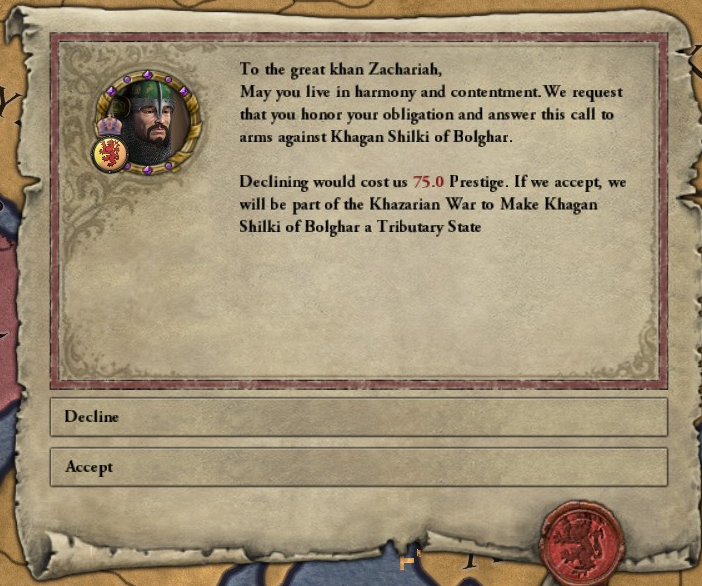
They would not have to wait for long. Less than one month later, less predictable news would come in. Árpád Álmos, Khagan of Magyar until now, settled down in his newly conquered lands over the Carpathians and took on the title of King of Hungary.
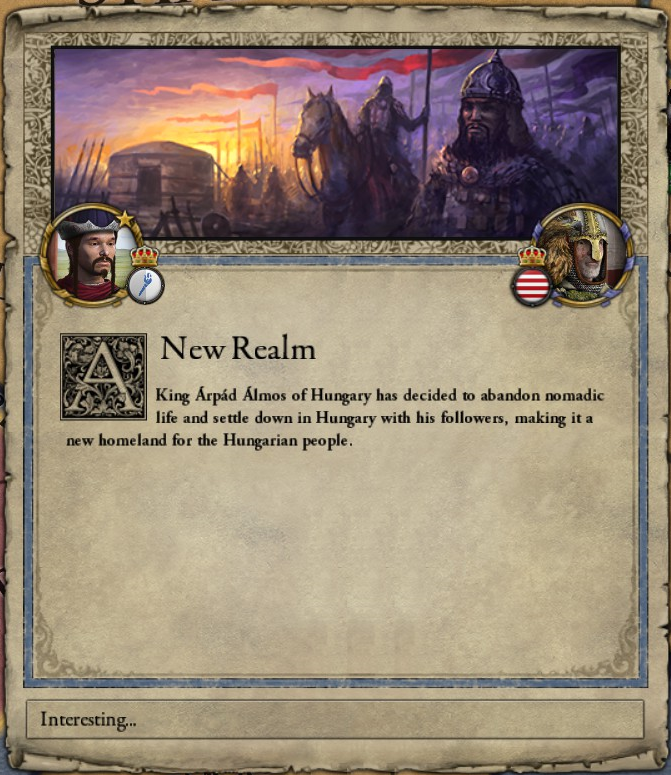
That had been anticipated so far – in stark contrast to him abandoning the lands he had staged his invasion from, the plains of Etelköz, and handing the Magyar Khaganate to his former vassal Jenö Töhötöm. Instead of the sizeable Árpád army, the lands were now barely defended by a powerless Khagan that could muster a few hundred men at most.
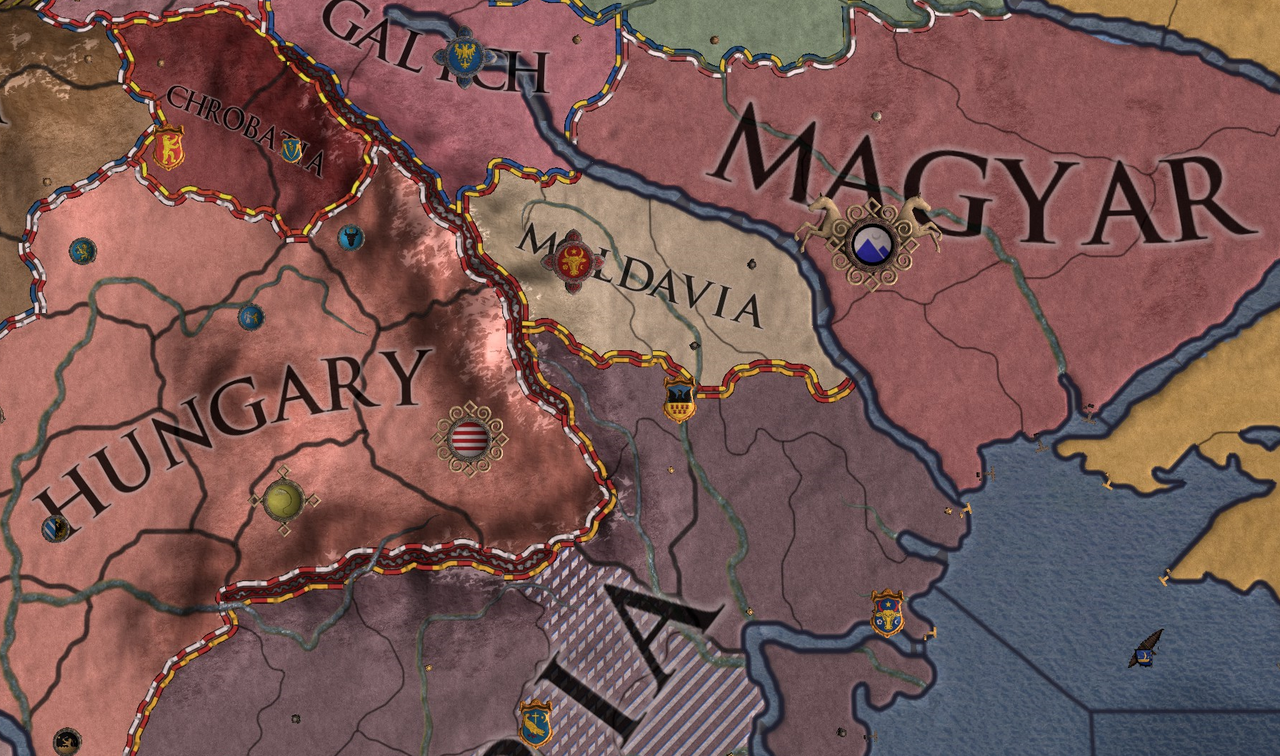
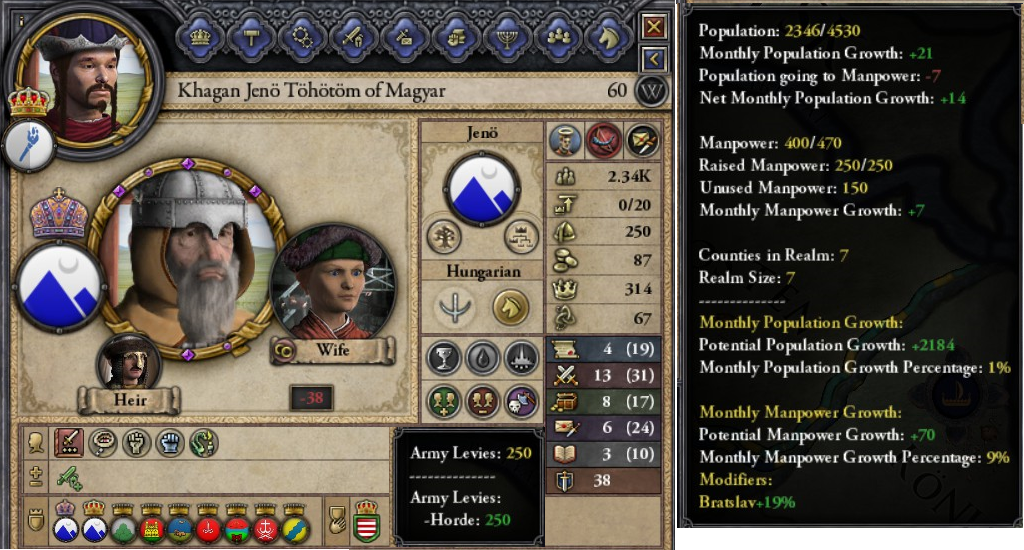
November 23, 869 AD
The sudden power vacuum to the west was met with joyous disbelief by Zachariah and his council – even the disgruntled Kundac seemed to be content (though he mumbled something about "punch at your own weight" when the news came in). All troops were ordered to gather in the immediate vicinity of the Magyar border. The only question was the specific Casus Belli on Töhötöm to present once the troops were ready to strike. Zachariah let his chancellor Ezra describe the options.
"Although we can all personally agree on whatever reason for a war on the Magyars is fine, a full-on invasion is out of question. Our lands have proved to be worthier than expected, and we're far from having to migrate soon – which is how these wars are usually justified. The men wouldn't follow suit and frankly, there aren't enough of them to stage something like this.
Taking a smaller bite out of their land would be much less troublesome – these minor border shifts are common in the Steppes, but gaining land for Khazaria would still be considered greatly honorous. We would also gain a little potential towards a larger population in the future, though Töhötöm's people currently inhabiting the area would probably flee.
We could also attempt to make them our tributary...or make him publicly declare defeat and acknowledge that you are far beyond him. That would certainly convince some of his people to join our side instead of witnessing the inevitable fall of this pathetic appendix of Árpád's success. Every option has its own implications."
"As usual", Zachariah responded. "What I'm pretty sure of is that such a weak tributary would be more trouble than it's worth. Töhötöm has no income or troops to speak of, and there are going to be other people looking for easy land gains soon. I have no intent of defending him against his inevitable demise." Everyone nodded in approval.
"That leaves it at taking a modest amount of land or humiliating Töhötöm."
The discussion went back and forth. The strip of land in question was the province of Lower Dniepr, located in a strategically valuable position on the other side of its namesake river's estuary into the Black Sea. Töhötöm had just given those lands to a man named Somogy Csongor - no one was quite sure of his reasons, but it didn't matter much for the conquest plans. A humiliation war would in turn fasten the population growth needed for a proper invasion in the future, although the Magyar lands were sparsely settled and more than a few hundred souls flocking over were not to be expected.
In the end, both options seemed equally viable. With his council approving of any feasible option, the last word was up to Zachariah.
"We're taking the land. It will provide easier access to the Magyar lands for future wars, which no doubt will come. And barely humiliating him without territorial concessions would leave more of the Etelköz plains for the Russian and Bulgarian neighbours, who will surely want their piece of the cake."
November 29, 869 AD
The Ashina army crossed the Dniepr with no enemies in sight. The envoy sent to confirm that Jenö was not willing to comply without a fight and in turn deliver the formal war declaration had returned half an hour ago.
General Khatir rode along the rows of his men. When he was done, he raised his voice.
"Warriors of the Ashina tribe! You've proven your worth for Khazaria time and time again. Today the time has come for all our efforts to finally bear fruit. We're expanding our borders for the first time in decades – and to be fully clear, we aren't expecting much resistance. We outnumber Jenö's host ten to one. That means for you to stay safe from ambushes and traps..."
Khatir went on in short and concise points how to avoid unnecessary casualties against far inferior enemy numbers. He was a hot-blooded warrior who always went by the principle that attack is the best defense, but he knew that single casualties were all they had to lose and he cared for his men. In the months after his appointment, it had shown quickly that not only did he have a tremendous talent for battle tactics, but he also quickly became a father figure and role model for the numerous new faces in the growing Ashina army. There was hardly anyone in this row he didn't know by name, and in doubt he was the one who had to explain meaningless deaths to the bereaved families.
Khatir closed with the Khazarian war cry. Over 2000 men yelled out in response and set their horses into motion to the plains of Lower Dniepr, the gate to the steppes beyond the river that had formed Khazaria's border for a long time.
Autumn, 869 AD
Manasseh's call to arms for the war against Khagan Shilkhi of Bolghar arrived on September 15. In contrast to the last time, Khan Bulçan of Bulçir was not willing to join the war this time. He refused to aid a Khagan which he didn't respect with his exploits beyond the borders and would rather endure the mockery of the other Khans (who secretly admired his consequence).
Although refusing to aid the Khagan expanding was not as dishonorable as refusing to defend the realm, Zachariah's rule to accept the call was executed and the Ashina clan was at war again, barely two months after Surt of Pechenegs had been defeated. As of Zachariah's orders, the Ashina host held its position until further notice.

They would not have to wait for long. Less than one month later, less predictable news would come in. Árpád Álmos, Khagan of Magyar until now, settled down in his newly conquered lands over the Carpathians and took on the title of King of Hungary.

That had been anticipated so far – in stark contrast to him abandoning the lands he had staged his invasion from, the plains of Etelköz, and handing the Magyar Khaganate to his former vassal Jenö Töhötöm. Instead of the sizeable Árpád army, the lands were now barely defended by a powerless Khagan that could muster a few hundred men at most.


November 23, 869 AD
The sudden power vacuum to the west was met with joyous disbelief by Zachariah and his council – even the disgruntled Kundac seemed to be content (though he mumbled something about "punch at your own weight" when the news came in). All troops were ordered to gather in the immediate vicinity of the Magyar border. The only question was the specific Casus Belli on Töhötöm to present once the troops were ready to strike. Zachariah let his chancellor Ezra describe the options.
"Although we can all personally agree on whatever reason for a war on the Magyars is fine, a full-on invasion is out of question. Our lands have proved to be worthier than expected, and we're far from having to migrate soon – which is how these wars are usually justified. The men wouldn't follow suit and frankly, there aren't enough of them to stage something like this.
Taking a smaller bite out of their land would be much less troublesome – these minor border shifts are common in the Steppes, but gaining land for Khazaria would still be considered greatly honorous. We would also gain a little potential towards a larger population in the future, though Töhötöm's people currently inhabiting the area would probably flee.
We could also attempt to make them our tributary...or make him publicly declare defeat and acknowledge that you are far beyond him. That would certainly convince some of his people to join our side instead of witnessing the inevitable fall of this pathetic appendix of Árpád's success. Every option has its own implications."
"As usual", Zachariah responded. "What I'm pretty sure of is that such a weak tributary would be more trouble than it's worth. Töhötöm has no income or troops to speak of, and there are going to be other people looking for easy land gains soon. I have no intent of defending him against his inevitable demise." Everyone nodded in approval.
"That leaves it at taking a modest amount of land or humiliating Töhötöm."
The discussion went back and forth. The strip of land in question was the province of Lower Dniepr, located in a strategically valuable position on the other side of its namesake river's estuary into the Black Sea. Töhötöm had just given those lands to a man named Somogy Csongor - no one was quite sure of his reasons, but it didn't matter much for the conquest plans. A humiliation war would in turn fasten the population growth needed for a proper invasion in the future, although the Magyar lands were sparsely settled and more than a few hundred souls flocking over were not to be expected.
In the end, both options seemed equally viable. With his council approving of any feasible option, the last word was up to Zachariah.
"We're taking the land. It will provide easier access to the Magyar lands for future wars, which no doubt will come. And barely humiliating him without territorial concessions would leave more of the Etelköz plains for the Russian and Bulgarian neighbours, who will surely want their piece of the cake."
November 29, 869 AD
The Ashina army crossed the Dniepr with no enemies in sight. The envoy sent to confirm that Jenö was not willing to comply without a fight and in turn deliver the formal war declaration had returned half an hour ago.
General Khatir rode along the rows of his men. When he was done, he raised his voice.
"Warriors of the Ashina tribe! You've proven your worth for Khazaria time and time again. Today the time has come for all our efforts to finally bear fruit. We're expanding our borders for the first time in decades – and to be fully clear, we aren't expecting much resistance. We outnumber Jenö's host ten to one. That means for you to stay safe from ambushes and traps..."
Khatir went on in short and concise points how to avoid unnecessary casualties against far inferior enemy numbers. He was a hot-blooded warrior who always went by the principle that attack is the best defense, but he knew that single casualties were all they had to lose and he cared for his men. In the months after his appointment, it had shown quickly that not only did he have a tremendous talent for battle tactics, but he also quickly became a father figure and role model for the numerous new faces in the growing Ashina army. There was hardly anyone in this row he didn't know by name, and in doubt he was the one who had to explain meaningless deaths to the bereaved families.
Khatir closed with the Khazarian war cry. Over 2000 men yelled out in response and set their horses into motion to the plains of Lower Dniepr, the gate to the steppes beyond the river that had formed Khazaria's border for a long time.
Last edited:
With all the turmoil and uncertainty going on its good that Zacharia is finding oppurtunities to expand his own influence, even if it is only a small bit of land.
Chapter 10 - The First Victory
Chapter 10 - The First Victory
October, 870 AD
As expected, the war on what remained of Magyar was short and one-sided. Khatir's forces spilled into the plains, quickly had Töhötöm's humble defenses surrounded and defeated them in what was more of a demonstration than a fight to begin with. Only five to seven men were lost during the battle of Bratslav (according to witnesses, two guys had got in conflict over who had slain more men, got distracted and rode into their own men's arrow volley – the military scribes later disputed if that technically counted as "fallen in battle" or was a particularly stupid accident). In March 870, less than four months after the war had started, Khagan Jenö conceded the lands west of the Dniepr to Khan Zachariah of Ashina.
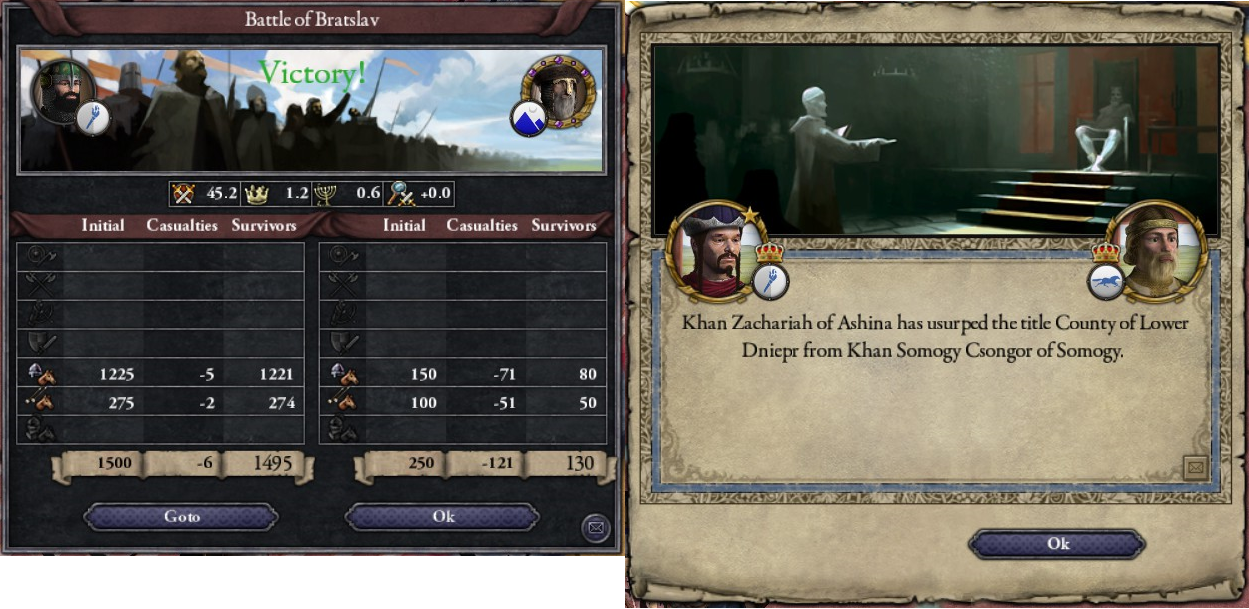
Sources verify contradictions about the casualty numbers.
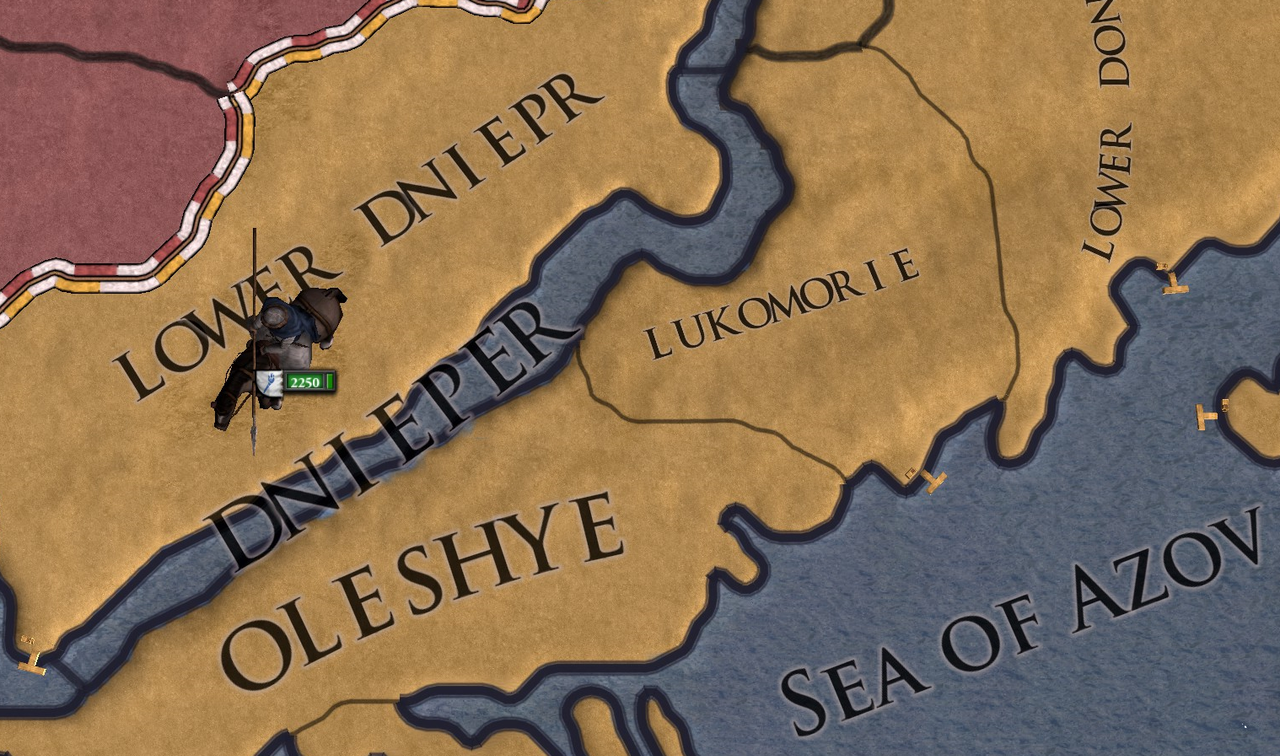
The newly expanded northern half of the Ashina lands.
Khagan Manasseh's campaign against Shilki of Bolghar was successful too. The Bolghar forces were never able to consolidate their ranks, mainly due to poor commanding, and got defeated several times in the first half of 870. When the Khazarian forces – with the exception of the Ashina troops who were busy in Magyar – took over the Bolghar Khagan's heartlands in September, Shilki was forced to surrender and henceforth pay tribute in coin and in kind to Manasseh.
Conversely, the situation in Pronsk was looking dire for the few defenders remaining. Manasseh had yet made no effort at all to protect his tributary (who had been in open revolt against him not too long ago), and so the peasant army from Vorotynsk and the host of High Chief Yelisey of Polotsk, whose vassals had joined his efforts, were now carving up Pronsk without much resistance. The Pronskian army - who had had no time to recover after the Khazarian-Pecheneg war and thus was only 800-odd men strong - had managed to pick off a minor reinforcement regiment, but otherwise had to helplessly watch their country falling apart until help arrived.
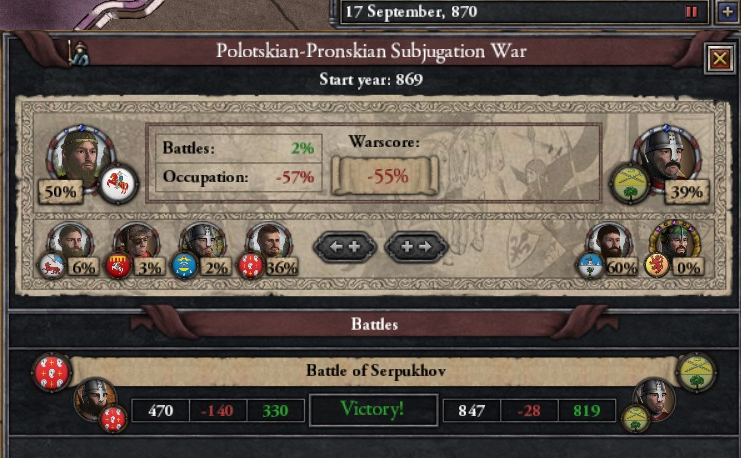
They should have to wait a while longer. When Bolghar surrendered, the Khazarian army started its long way westwards, but they would not be there for several weeks and would still be outnumbered when they arrived.
In the meantime, this did not concern Zachariah in the slightest. He had ordered his victorious army to plunder the Magyar lands along their new border to refund the humble war efforts and otherwise, as usual, kept a low profile in the larger picture. If Manasseh could not be bothered to protect Pronsk, it sure wasn't his responsibility to intervene.
That gave him time to spend with Shurkka, the young Theodosian girl he had chosen as his concubine upon his ascendency. In contrast to his wife who he had at best a professional relationship to, he had actually grown to like her wits and light-heartedness. She always had a kind word for no matter whom and no one was better at soothing Zachariah's occasional outbursts of anger and anxiety, particularly when he had to make important decisions. That made it bearable when she overdid it on new clothes or yurt decorations on Zachariah's expense.
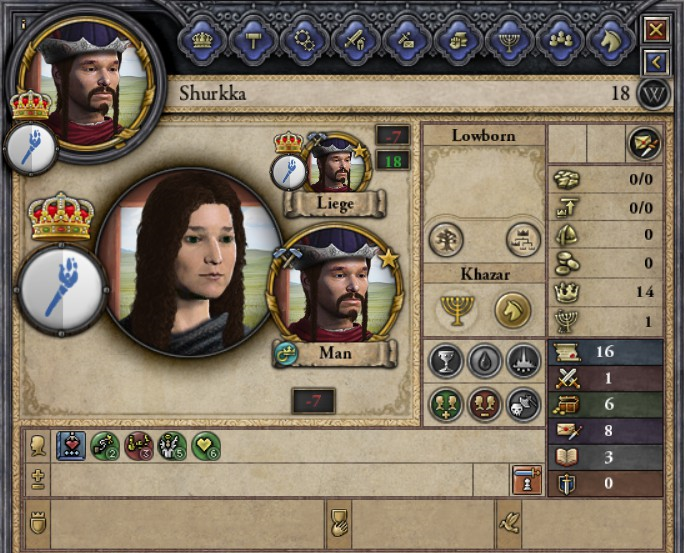
They had frequently went for rides along the shore. Shurkka had grown up here, while Zachariah and his people were still fairly new to living on the sea. More than once, they witnessed modest fishing operations, mostly scattered hamlets of no more than a few huts and they had frequently talked about how the Ashina would probably stay coastal for quite a while. Supporting a fishing outpost near their main settlement could prove a useful additional food source for little investment. The settlement had already seen some improvements over the past years, but they had mostly been for military purposes. Now the Ashina started to actually make themselves home.
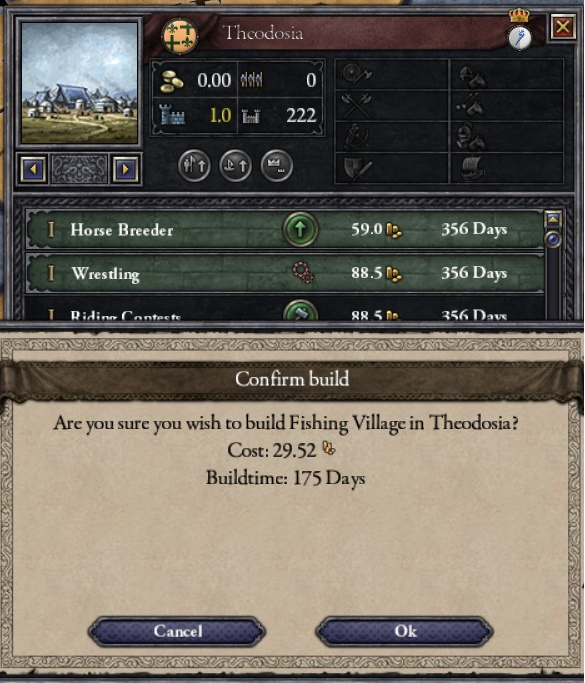
October, 870 AD
As expected, the war on what remained of Magyar was short and one-sided. Khatir's forces spilled into the plains, quickly had Töhötöm's humble defenses surrounded and defeated them in what was more of a demonstration than a fight to begin with. Only five to seven men were lost during the battle of Bratslav (according to witnesses, two guys had got in conflict over who had slain more men, got distracted and rode into their own men's arrow volley – the military scribes later disputed if that technically counted as "fallen in battle" or was a particularly stupid accident). In March 870, less than four months after the war had started, Khagan Jenö conceded the lands west of the Dniepr to Khan Zachariah of Ashina.

Sources verify contradictions about the casualty numbers.

The newly expanded northern half of the Ashina lands.
Khagan Manasseh's campaign against Shilki of Bolghar was successful too. The Bolghar forces were never able to consolidate their ranks, mainly due to poor commanding, and got defeated several times in the first half of 870. When the Khazarian forces – with the exception of the Ashina troops who were busy in Magyar – took over the Bolghar Khagan's heartlands in September, Shilki was forced to surrender and henceforth pay tribute in coin and in kind to Manasseh.
Conversely, the situation in Pronsk was looking dire for the few defenders remaining. Manasseh had yet made no effort at all to protect his tributary (who had been in open revolt against him not too long ago), and so the peasant army from Vorotynsk and the host of High Chief Yelisey of Polotsk, whose vassals had joined his efforts, were now carving up Pronsk without much resistance. The Pronskian army - who had had no time to recover after the Khazarian-Pecheneg war and thus was only 800-odd men strong - had managed to pick off a minor reinforcement regiment, but otherwise had to helplessly watch their country falling apart until help arrived.

They should have to wait a while longer. When Bolghar surrendered, the Khazarian army started its long way westwards, but they would not be there for several weeks and would still be outnumbered when they arrived.
In the meantime, this did not concern Zachariah in the slightest. He had ordered his victorious army to plunder the Magyar lands along their new border to refund the humble war efforts and otherwise, as usual, kept a low profile in the larger picture. If Manasseh could not be bothered to protect Pronsk, it sure wasn't his responsibility to intervene.
That gave him time to spend with Shurkka, the young Theodosian girl he had chosen as his concubine upon his ascendency. In contrast to his wife who he had at best a professional relationship to, he had actually grown to like her wits and light-heartedness. She always had a kind word for no matter whom and no one was better at soothing Zachariah's occasional outbursts of anger and anxiety, particularly when he had to make important decisions. That made it bearable when she overdid it on new clothes or yurt decorations on Zachariah's expense.

They had frequently went for rides along the shore. Shurkka had grown up here, while Zachariah and his people were still fairly new to living on the sea. More than once, they witnessed modest fishing operations, mostly scattered hamlets of no more than a few huts and they had frequently talked about how the Ashina would probably stay coastal for quite a while. Supporting a fishing outpost near their main settlement could prove a useful additional food source for little investment. The settlement had already seen some improvements over the past years, but they had mostly been for military purposes. Now the Ashina started to actually make themselves home.

Last edited:
Good job by the Khan at recognizing a weakened enemy and taking advantage of it, Zacharia should turn his efforts to getting an heir though, its a dangerous world.
Right?He's taking action! Will miracles never cease?
Good job by the Khan at recognizing a weakened enemy and taking advantage of it, Zacharia should turn his efforts to getting an heir though, its a dangerous world.
Absolutely. He's been trying without much success in the past, and we're to see more of his women soon.
Chapter 11 - Bloody Varangians
Chapter 11 - Bloody Varangians
May 21, 871 AD
Ezra's predictions when war had broken out around Khazaria less than two years ago had turned out accurate, perhaps more so and certainly faster than he had expected himself. The Chancellor was making his way along Marshal Tabghaç towards the central yurt where the council would convene. Both were riding with their heads high and a confident smile on their face.
In the early days of 871, Dyre of Könugardr had completed his war on Smolensk and immediately turned to further securing his presence in the region by demanding the "Liberation of Chernigov" of Khagan Manasseh II.
This demand was met with some confusion at the Khazarian court. The men in the Steppes were already free and answered to God and their families' needs, none else. The Khans were their highest judges and commanders, but each man was his own master. Through strength and devotion, everyone could make for his fate, no matter his birthright. That did not hold true so much for many of the sedentary tribes in the Russian plains. Also, no one had heard of Chernigov being a part of Khazarian lands until now.
It was soon clarified that Novgorod Seversky, a rather small but lush bit of land on their new border to Dyre's realm, was considered to be a historical part of the Duchy of Chernigov and he intended to "free" it by integrating it into his lands. Of course Khagan Manasseh, as much an admirer of freedom as he was (his own words), was having none of this and straight-out refused Dyre's claims, leading to the Varangian conqueror declaring war in turn.
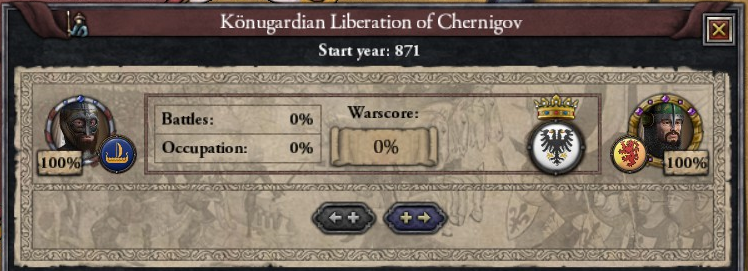
Khagan Manasseh immediately called in his vassals. Zachariah, always being true to himself, had been hesitant whether to send troops to the Könugardr front, but his council eventually convinced him that this was about showing a foreign invader his place, who would prove much less troublesome later if he was kept in check now. A weak Könugardr could even be a target for invasion in the future. The Ashina host joined forces with the Khagan's armies near the Desna river and the Khazarian-Könugardian border.
In later April, word had come from Khan Yavdi of Jabdertim, the northern neighbour to the Ashina clan, whose men had been wanting to probe for territory in the chiefdom of Chernigov - they had inadvertently run into the Könugardr army on its way to Novgorod Seversky and tried to turn around, but it was already too late. Now the 1700 Jabdertim men were trapped by a force of almost 5000 Könugardr warriors. They would not be able to hold out for long. Yet the Könugardr commanders had themselves not been aware of the much larger force just across the Desna. Khagan Manasseh immediately set the troops into motion.
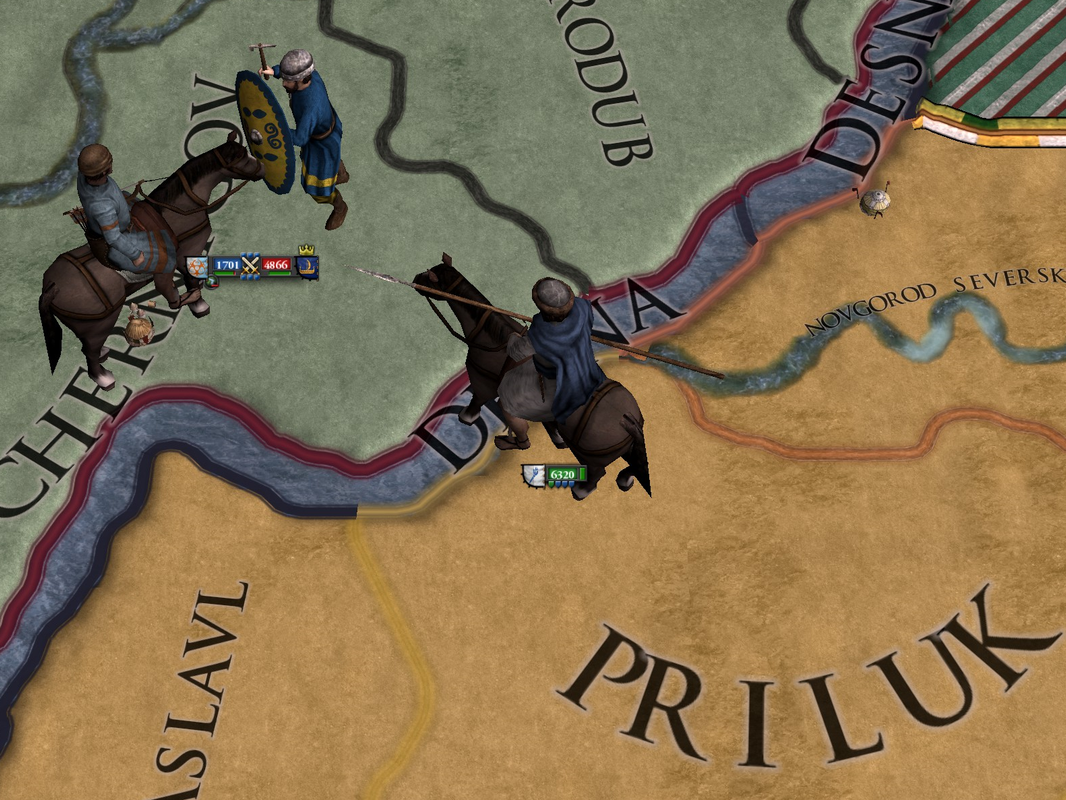
The Jabdertim were struggling to hold ground, but the Khazarian main army made it before they had to surrender to Dyre's army, who was advancing under heavy losses from the Jabdertim archer fire. The earth shook when a horde of over 6000 Khazarian warriors tore into the remaining 4400 Varangian troops, which mainly consisted of light-armed footmen.
They fell like flies to the Khazarian swords, spears and hooves. The survivors would speak of a terrible bloodbath, something they could never have imagined before. For every Jabdertim warrior they had got in the costly advance, seven Könugardians fell in the subsequent carnage. Within minutes, any morale or organization had disappeared and the proud vikings ran for their lives.
When Dyre's troops managed their retreat, not only was the war effectively lost to him in the first major encounter, but his future prospects had taken a massive dent. The Könugardian army had been utterly devastated by the Khazarians. Of almost 5000 men, only 2000 had made it out alive.
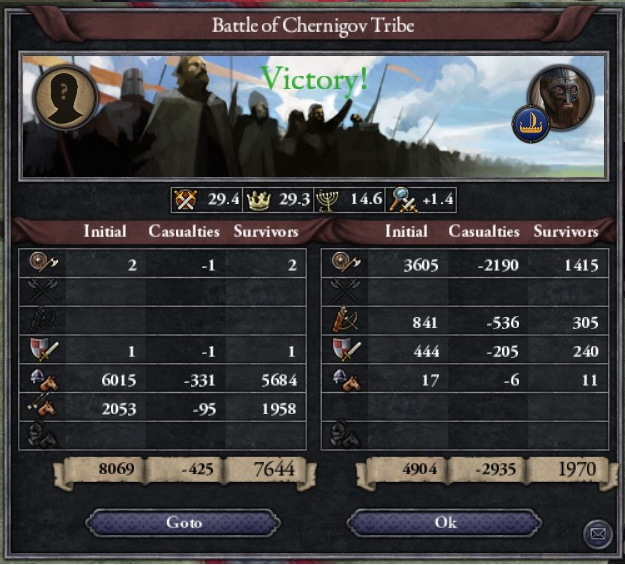
Ezra and Tabghaç had arrived, and the council rejoiced upon hearing of the news that Dyre was defeated so profoundly. It was Yeldem who first got back to seriousness by thinking aloud what the next move should possibly be. Tabghaç answered her.
"Sticking to the Khagan's armies would probably be the safe bet in case the Varangians regroup and try to fight back once again. It might though turn out redundant. You don't exactly need a force of several thousand men to smoke out some villages and hillforts."
Yeldem responded "Keeping the troops safe by sticking together also doesn't get you far if you can't support them. Depending on Manasseh's own plans, attrition might become an issue for a concentrated force of this size."
Now Zachariah added: "You're right – after this slaughterfest there's no real need of sticking with the main host. But I'm not comfortable with leaving our troops too far away from support. If we're moving independently, see that there's an option to leave or call in reinforcements on time. I don't want us to be on the receiving end of their revenge should they recover. I trust you, Tabghaç, to see this arranged."
"Yes, my Khan. I would recommend us to stay put in Chernigov and prepare the sieging of the Könugardian fort in the area. Manasseh's troops are heading south to Dyre's capital. The Varangians have fled west, and from that side the lands are protected by the Dniepr. That should give us enough time to pull out , should they come back with reinforced numbers."
"Good. See that the siege is taken up. You're both right – no reason to pass on the spoils after winning the battle. And always stay cautious."
Everyone nodded in approval.
May 21, 871 AD
Ezra's predictions when war had broken out around Khazaria less than two years ago had turned out accurate, perhaps more so and certainly faster than he had expected himself. The Chancellor was making his way along Marshal Tabghaç towards the central yurt where the council would convene. Both were riding with their heads high and a confident smile on their face.
In the early days of 871, Dyre of Könugardr had completed his war on Smolensk and immediately turned to further securing his presence in the region by demanding the "Liberation of Chernigov" of Khagan Manasseh II.
This demand was met with some confusion at the Khazarian court. The men in the Steppes were already free and answered to God and their families' needs, none else. The Khans were their highest judges and commanders, but each man was his own master. Through strength and devotion, everyone could make for his fate, no matter his birthright. That did not hold true so much for many of the sedentary tribes in the Russian plains. Also, no one had heard of Chernigov being a part of Khazarian lands until now.
It was soon clarified that Novgorod Seversky, a rather small but lush bit of land on their new border to Dyre's realm, was considered to be a historical part of the Duchy of Chernigov and he intended to "free" it by integrating it into his lands. Of course Khagan Manasseh, as much an admirer of freedom as he was (his own words), was having none of this and straight-out refused Dyre's claims, leading to the Varangian conqueror declaring war in turn.

Khagan Manasseh immediately called in his vassals. Zachariah, always being true to himself, had been hesitant whether to send troops to the Könugardr front, but his council eventually convinced him that this was about showing a foreign invader his place, who would prove much less troublesome later if he was kept in check now. A weak Könugardr could even be a target for invasion in the future. The Ashina host joined forces with the Khagan's armies near the Desna river and the Khazarian-Könugardian border.
In later April, word had come from Khan Yavdi of Jabdertim, the northern neighbour to the Ashina clan, whose men had been wanting to probe for territory in the chiefdom of Chernigov - they had inadvertently run into the Könugardr army on its way to Novgorod Seversky and tried to turn around, but it was already too late. Now the 1700 Jabdertim men were trapped by a force of almost 5000 Könugardr warriors. They would not be able to hold out for long. Yet the Könugardr commanders had themselves not been aware of the much larger force just across the Desna. Khagan Manasseh immediately set the troops into motion.

The Jabdertim were struggling to hold ground, but the Khazarian main army made it before they had to surrender to Dyre's army, who was advancing under heavy losses from the Jabdertim archer fire. The earth shook when a horde of over 6000 Khazarian warriors tore into the remaining 4400 Varangian troops, which mainly consisted of light-armed footmen.
They fell like flies to the Khazarian swords, spears and hooves. The survivors would speak of a terrible bloodbath, something they could never have imagined before. For every Jabdertim warrior they had got in the costly advance, seven Könugardians fell in the subsequent carnage. Within minutes, any morale or organization had disappeared and the proud vikings ran for their lives.
When Dyre's troops managed their retreat, not only was the war effectively lost to him in the first major encounter, but his future prospects had taken a massive dent. The Könugardian army had been utterly devastated by the Khazarians. Of almost 5000 men, only 2000 had made it out alive.

Ezra and Tabghaç had arrived, and the council rejoiced upon hearing of the news that Dyre was defeated so profoundly. It was Yeldem who first got back to seriousness by thinking aloud what the next move should possibly be. Tabghaç answered her.
"Sticking to the Khagan's armies would probably be the safe bet in case the Varangians regroup and try to fight back once again. It might though turn out redundant. You don't exactly need a force of several thousand men to smoke out some villages and hillforts."
Yeldem responded "Keeping the troops safe by sticking together also doesn't get you far if you can't support them. Depending on Manasseh's own plans, attrition might become an issue for a concentrated force of this size."
Now Zachariah added: "You're right – after this slaughterfest there's no real need of sticking with the main host. But I'm not comfortable with leaving our troops too far away from support. If we're moving independently, see that there's an option to leave or call in reinforcements on time. I don't want us to be on the receiving end of their revenge should they recover. I trust you, Tabghaç, to see this arranged."
"Yes, my Khan. I would recommend us to stay put in Chernigov and prepare the sieging of the Könugardian fort in the area. Manasseh's troops are heading south to Dyre's capital. The Varangians have fled west, and from that side the lands are protected by the Dniepr. That should give us enough time to pull out , should they come back with reinforced numbers."
"Good. See that the siege is taken up. You're both right – no reason to pass on the spoils after winning the battle. And always stay cautious."
Everyone nodded in approval.
Last edited:
Depending on how one defines "low effort", you might be in for a surprise not too long down the road.Sometimes the low-effort approach works - though not in the production of an heir.

